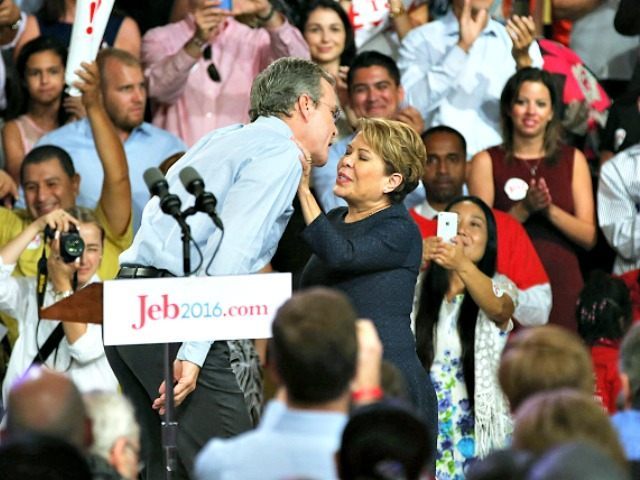Jeb Bush’s new Spanish-language campaign ad sidelines America’s unifying patriotism in favor of repeated praise for post-American multi-cultural diversity and praise for Latino culture brought by migrants, an expert says.
“The ad is was post-patriotism, post-American… [when] it could have been a mix talking about [the value of] assimilation,” says John Fonte, the director of the Center for American Common Culture at the D.C.-based Hudson Institute. “It has nothing to do with being an American,” he added.
The one-minute ad begins with an American flag, but it is quickly dominated by appeals to Latino culture. “For me, Hispanic culture is very important and positive,” Bush says, in Spanish. “Hispanics contribute every day more to our culture [and] are an integral part of the American dream,” he says.
“You know, but at the end it’s just that, you know, faith, friends and family,” said Jeb’s Mexican-born wife, Columba.
The ad includes three images of the unifying American flag, but two of those images are tucked in the background. The bulk of the ad shows Hispanics meeting with Bush as he praises Hispanic culture.
That ad accurately shows Jeb Bush’s view of himself as one step beyond a mere American, Fonte adds.
Prior politicians used foreign languages to reach new groups of immigrant voters — Teddy Roosevelt, would speak in German, for example — but they wrapped their messages up in a unifying patriotic appeal, said Fonte. “There’s nothing particularly American in this ad,” he said.
Bush’s post-American pitch isn’t working with American voters, who are increasingly opposed to the painful and disorienting changes brought by government-imposed diversity and technologically-imposed global trade. Bush’s poll rating are now down under 10 percent in New Hampshire, where he and his team had expected to win the GOP primary. Instead of a win, he’s losing to Donald Trump’s American-boosterism.
GOP appeals to the Democratic-leaning Hispanic voters are unlikely to succeed, partly because Latinos — which will comprise roughly 12 percent of the electorate in 2016 — are concentrated in a few states, such as California, Texas and Florida, and favor big-government programs, such as Obamacare.
The mass of evidence shows that Bush is entirely sincere and deeply committed to his post-American worldview.
“I’m bicultural—maybe that’s more important than bilingual,” Bush said during a November 2013 interview in New York.
Diversity is “the blessing, truly a blessing, to be able to experience in a way that adds a tremendous amount of vitality to my life,” he said in 2013. “We chose Miami to live because it is a bicultural city… [and] I wanted my children to grow up in a bicultural way,” he said.
I spend the night with my … wife who was born outside the United States… On Sunday fun-days … I get to be with George Helena Walker Bush, my little munchkin 22-month-old grand-daughter [whose] mom was born in Canada [of] Iraqi national parents… Being able to share that culture and live in it has been one of the great joys of my life.
This sympathy for Hispanic culture also explains his much repeated determination to boost Latino immigration into the United States.
In 2014, he showed his emotional sympathy for illegal immigrants, saying “Someone who comes to our country because they couldn’t come legally, because a dad who loved their children was worried that their children didn’t have food on the table, and wanted to ensure that their family remained intact … Yes, they broke the law, but it’s not a felony. It’s an act of love, it’s an act of commitment to your family.”
He’s so determined to promote Latino migration that he repeatedly insults Americans as unproductive, old and uninteresting. “If we’re going to grow at four percent a year, we have to have young, aspiring people be able to create dynamic activity. And we can’t do that with our existing demographics,” he said in a 2014 interview.
He’s repeatedly used the same foreigners-are-more-dynamic-than-Americans phrase in his speeches to Americans and American reporters. “We have to be young, aspirational and dynamic again,” Bush said to a meeting of conservative activists in February 2015, where he urged “immigration reform” that would invite foreign graduates to take white-collar jobs in the United States.
Bush’s rejection of his own American culture suggests a similarity with President Barack Obama, noted David Frum, an author and a Canadian immigrant.
Barack Obama, as an organizer in the poor African-American neighborhoods of Chicago; Jeb Bush in Mexico, Venezuela, and at last in Cuban-influenced Miami. Both are men who have talked a great deal about the feeling of being “between two worlds”: Obama, in his famous autobiography; Bush, in his speeches. Both chose wives who would more deeply connect them to their new chosen identity. Both derived from their new identity a sharp critique of their nation as it is. Both have built their campaign for president upon a deep commitment to fundamental transformation of their nation into what they believe it should be.

COMMENTS
Please let us know if you're having issues with commenting.